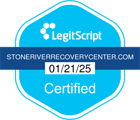Cocaine, derived from the leaves of the coca plant, is a powerful central nervous system stimulant. While some use it recreationally, seeking euphoria and heightened energy, many find themselves entangled in a web of addiction. It is crucial to recognize the signs of cocaine addiction for early intervention and effective treatment.
Some signs of a cocaine addiction include the following:
- Changes in behavior: Individuals addicted to cocaine often undergo significant behavioral shifts. They may become increasingly secretive, isolate themselves from friends and family, and engage in erratic or risky behavior.
- Physical signs: The physical toll of cocaine addiction is unmistakable. Users may experience dilated pupils, rapid weight loss, and nosebleeds, particularly if they snort the drug. Track marks or scars may also be present, depending on the method of administration.
- Psychological symptoms: Cocaine addiction takes a toll on mental health, manifesting as anxiety, paranoia, and extreme mood swings. Individuals may also exhibit signs of depression during periods of withdrawal.
- Financial troubles: Funding a cocaine habit can be financially crippling. Those addicted may experience sudden financial difficulties, borrowing money frequently or depleting savings to sustain their drug use.
Cocaine is a dangerous drug that comes with serious risks. It can place an immense strain on the cardiovascular system, elevating the risk of heart attacks, strokes, and other cardiac complications. The stimulant properties of cocaine can cause irregular heart rhythms and hypertension, posing life-threatening dangers.
The repercussions of cocaine addiction extend beyond physical and mental health. Individuals may face strained relationships, loss of employment, and legal troubles due to erratic behavior or criminal activities associated with drug use.
Cocaine Withdrawal Symptoms
Withdrawal symptoms can occur when someone who has been using cocaine regularly suddenly stops or reduces their intake. These symptoms can vary in intensity and duration, and they may include:
- Intense cravings or desires to use cocaine
- Extreme tiredness and lack of energy
- Persistent feelings of sadness, hopelessness, and a general low mood
- Increased appetite
- Disturbed sleep, such as difficulty falling asleep or staying asleep
- Vivid dreams and nightmares
- Easily becoming annoyed, agitated, or frustrated
- Cognitive difficulties, such as slowed thought processes and difficulty concentrating
- Restlessness, nervousness, and increased anxiety
- Unfounded feelings of distrust or suspicion
- Heightened sensitivity to lights, sounds, and other stimuli
- Muscle aches and pain
Additionally, some individuals may experience a phenomenon known as a “crash” shortly after the effects of cocaine wear off, which can include feelings of exhaustion, irritability, and depression. Withdrawal from cocaine can be challenging, and individuals attempting to quit should seek professional help instead of trying to do it alone.
Treatment Options for Cocaine Addiction
According to the National Institute on Drug Abuse, nearly six percent of all admissions to substance abuse treatment programs were attributed to cocaine. Treating cocaine addiction may consist of the following approaches:
- Detoxification: The journey to recovery often begins with detoxification. This process allows the body to rid itself of cocaine and manage withdrawal symptoms. Medical supervision is crucial during this phase, as withdrawal from cocaine can lead to intense cravings and emotional distress.
- Behavioral therapy: Behavioral therapy, such as cognitive-behavioral therapy (CBT), is effective in addressing the psychological aspects of addiction. Behavioral therapies help individuals identify and modify destructive patterns of thinking and behavior.
- Support groups: Support groups, like Narcotics Anonymous (NA), provide a sense of community and understanding. Connecting with individuals who share similar struggles fosters a supportive environment crucial for recovery.
- Medication-assisted treatment: Those with a cocaine addiction may benefit from medication-assisted treatment to manage cravings and prevent relapse.
- Inpatient and outpatient programs: Depending on the severity of the addiction, inpatient or outpatient rehabilitation programs are an option to consider. Inpatient programs offer a structured environment with 24/7 support, while outpatient programs allow individuals to attend therapy sessions while maintaining their daily routines.
Reach Out for Help
If you or someone you love is struggling with an addiction to cocaine or another substance, the caring staff at Stone River Recovery Center in San Antonio, Texas, can help. We offer a range of services, such as detox services and residential treatment, that can be tailored to meet your unique needs. To find out more about all we have to offer, please contact us today.








